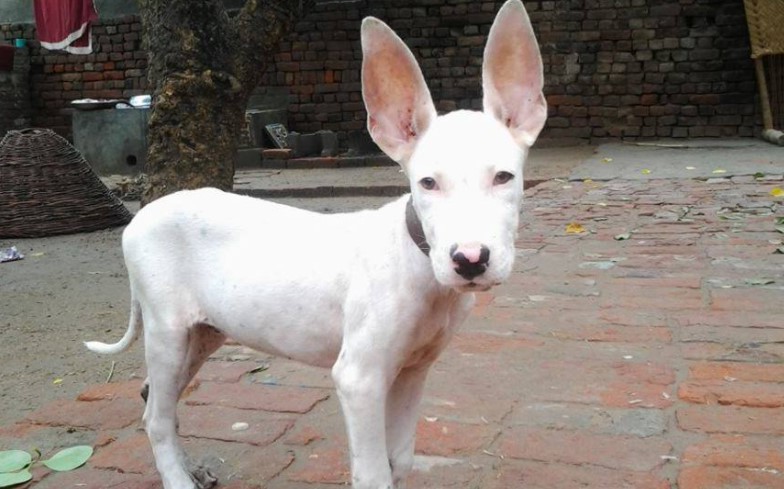The Gull Terrier, often called the Gull Terr, is a breed with deep roots in the history of the Indian subcontinent, specifically from the regions now known as India and Pakistan.
Originally bred from Bull Terriers introduced during the British Raj, these dogs were used in various capacities including dog fighting—a practice later banned—and more benign roles such as guarding and hunting due to their protective nature.
Over time, they have evolved from their combative origins to become loyal and protective companions, appreciated for their robust build and trainable disposition.
Today, Gull Terriers are known for their intelligence and adaptability, which make them suitable for various roles from family pets to working dogs.
Their unique characteristics have not only helped them carve a niche in popular culture through literature and films but have also garnered them a loving following on social media, further boosting their popularity.
Despite the challenges posed by breed-specific legislation in some regions, efforts by breed enthusiasts continue to promote responsible ownership and breeding practices to ensure their preservation.
Their physical attributes include a muscular build, a short smooth coat that comes in colors like black, brindle, fawn, and white, and a generally healthy constitution with predispositions to certain conditions like deafness and skin allergies, which require attentive care and regular veterinary check-ups.
History of Gull Terrier
The Gull Terrier, also known as the Gull Terr, has a rich and vibrant history that underscores its resilience and adaptability, qualities that have endeared it to dog enthusiasts around the world.
Originating in the Indian subcontinent during the British Raj, the breed was developed from the Bull Terrier and local breeds.
Initially bred for aggressive sports like dog fighting, Gull Terriers were later used as guard dogs after such sports were outlawed.
Their physical and behavioral traits reflect this history, combining strength, tenacity, and loyalty with a protective nature.
Over time, the Gull Terrier’s role has evolved significantly.
While they retain their protective instincts, they are also cherished as loyal and affectionate family pets. Their versatility makes them suitable for various roles beyond just guarding, including participation in modern dog sports and activities, where they showcase their intelligence and trainability.
Despite their sometimes challenging demeanor, with consistent training and socialization, Gull Terriers can be integrated well into family settings.
They are known for their muscular build, smooth coat, and medium size, characteristics that contribute to their distinct appearance and utility in various roles.
The Gull Terrier’s history is not just a story of a breed’s evolution but also a reflection of the changing human-animal relationship over time, highlighting the deep bond that can form between humans and their canine companions.
As modern breeding practices continue to evolve, there is a strong focus within the Gull Terrier community on health and genetic diversity, ensuring the breed’s longevity and wellbeing.
Gull Terrier Characteristics
The Gull Terrier, a breed with robust and striking features, displays a distinct set of physical and behavioral characteristics that make it both a formidable guard dog and a loyal companion.
Characterized by a muscular and sturdy build, the Gull Terrier typically weighs between 50-70 pounds and stands about 17-19 inches at the shoulder.
The breed sports a smooth coat that comes in various colors, including black, brindle, fawn, and predominantly white, which can sometimes contribute to genetic conditions like deafness due to the pigmentation genes involved.
Gull Terriers are highly intelligent and trainable.
Their sharp intellect and eagerness to please make them responsive to positive reinforcement training techniques. This breed is known for its problem-solving skills,
which can be a boon for owners looking to engage their pets in tasks and training exercises that challenge their minds and bodies.
Gull Terriers require regular physical activity to manage their energy levels.
They thrive in environments where they can engage in vigorous exercise like running and playing in secure areas.
Without adequate exercise, they may develop behavioral issues due to pent-up energy.
Their grooming needs are relatively minimal, requiring only weekly brushing and occasional baths to maintain their coat’s health and appearance.
Gull Terrier Care
Caring for a Gull Terrier involves a comprehensive approach tailored to their specific needs, focusing on their health, behavior, diet, and grooming.
Here are some essential guidelines for ensuring a healthy and happy life for a Gull Terrier:
Health Care
Gull Terriers are prone to certain health issues such as patellar luxation, hip dysplasia, and skin allergies.
Regular veterinary check-ups are crucial for early detection and management of these conditions.
Particular attention should be paid to their ears and eyes, which can be susceptible to problems due to their white coats, potentially leading to deafness or blindness.
Preventive measures such as the Brainstem Auditory Evoked Response (BAER) test are recommended for early detection of hearing issues.
Diet and Nutrition
A balanced diet rich in high-quality protein and essential nutrients is vital for maintaining their energetic lifestyle.
Incorporating whole grains and vegetables can provide necessary fibers and other nutrients.
Feeding should be adjusted according to their life stage—puppies may need several small meals a day while adults do well on two main meals.
Always ensure fresh water is available to aid in hydration and overall health.
Exercise and Mental Stimulation
Regular physical activity is essential to keep Gull Terriers fit and prevent behavioral issues.
They benefit from activities that challenge both their minds and bodies, such as agility training, daily walks, and interactive play.
It’s important to balance physical activity with adequate rest to prevent overexertion.
Grooming
Gull Terriers have a short, easy-to-care-for coat that requires regular brushing to remove loose hair and distribute skin oils.
They should be bathed only when necessary to avoid drying out their skin.
During the winter, a coat or sweater can help keep them warm, and booties might be necessary to protect their paws from cold and chemicals
Socialization and Training
Early and consistent socialization is crucial to prevent fear-based behaviors and to help Gull Terriers become well-adjusted adults.
Training should focus on positive reinforcement, rewarding good behaviors and avoiding punishment which can lead to fear and anxiety.
Techniques to manage overexcitement and aggression include regular exercise, mental stimulation, and teaching calm behaviors through commands like “sit” or “stay”.
Gull Terrier as a Family Pet
Compatibility with Children and Pets
Gull Terriers can be great family pets, particularly when properly socialized and trained from a young age.
Their interaction with children is generally positive, especially if they grow up together.
However, due to their strong protective instincts and potential for assertiveness, supervision is recommended when they are around unfamiliar children.
The breed’s historical background as guard dogs means they can be overly protective, which necessitates careful management and clear behavioral guidelines to prevent any aggressive tendencies.
While Gull Terriers can coexist with other household pets, their compatibility varies depending on the individual dog’s temperament and previous experiences.
They have a pronounced prey drive, which may be triggered by smaller animals like cats, rabbits, or birds. Successful integration with other pets requires controlled, gradual introductions, ensuring both the Gull Terrier and the new animals feel safe.
Creating a structured environment where each pet can retreat to their own space is crucial to maintaining harmony within the household.
Protective Instincts
Gull Terriers are naturally protective of their families, a trait that makes them excellent watchdogs. This protective nature is deeply ingrained, likely a carryover from their historical use in guarding and territorial duties.
They are generally wary of strangers and will alert their owners to any unusual activities or perceived threats.
While this makes them vigilant protectors, it also means that owners need to invest time in training to manage their guarding behaviors effectively.
This ensures that their protective instincts do not lead to aggressive behavior towards guests or unfamiliar people.
Training to manage these protective instincts involves consistent reinforcement of commands and setting clear boundaries.
It’s also beneficial to expose them to various social situations under controlled conditions to help them learn appropriate responses to strangers and new environments.
With the right training and socialization, Gull Terriers’ protective traits can be channeled positively, making them not just safe family members but also competent guardians.
Gull Terrier FAQ
1. Is the Gull Terrier suitable for first-time dog owners?

Dr. Emily Harper is a California-based veterinarian specializing in terrier breeds. With years of experience in veterinary medicine and a passion for terrier care, she focuses on breed-specific health, grooming, and behavior.
Emily’s journey began with a love for dogs, leading her to pursue a career in veterinary medicine and develop expertise in terriers. She has authored numerous articles on terrier health and grooming and educates pet owners on providing the best care for their companions.
In her free time, Dr. Harper enjoys hiking California’s trails with her rescue terriers, Max and Bella, and spending time with her family.


